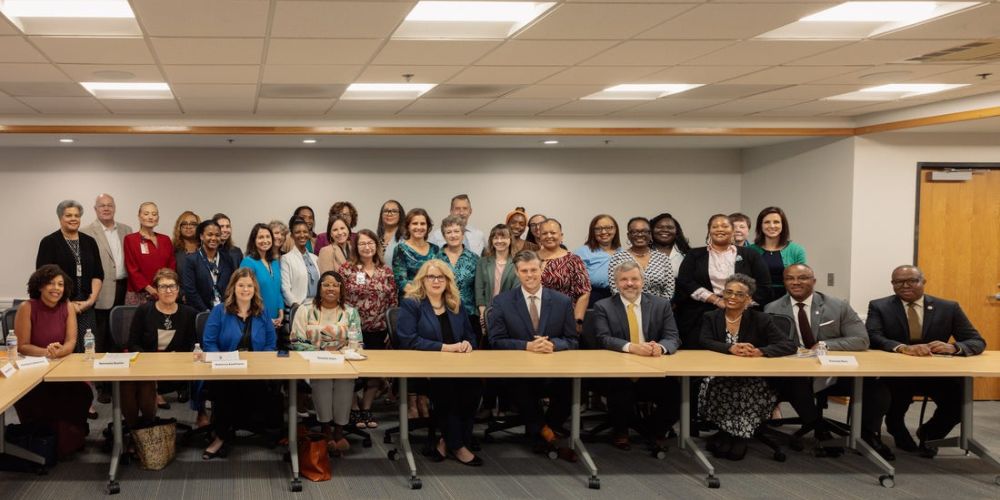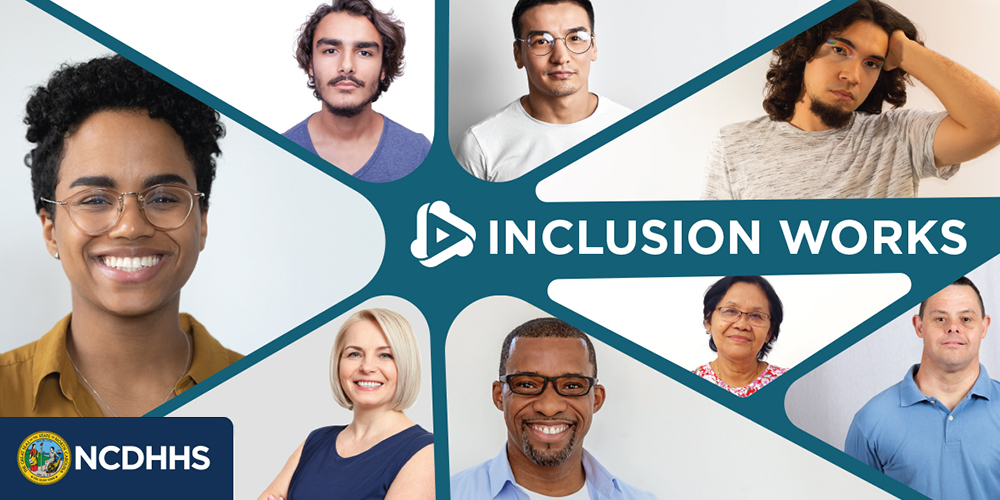|
|
|
|
|
|
 |
|
NCDHHS, HRSA and other organizations held a roundtable at the Wake County Human Services Department in Raleigh on Sept. 21 to discuss maternal health. Photo Credit: Wake County
NCDHHS is one of several entities selected for the U.S. Department of Health and Human Services’ Health Resources and Services Administration's (HRSA) investment in increasing access to maternal care, addressing maternal mental health and growing the maternal health workforce in North Carolina. The department is committed to addressing the maternal mortality crisis and ongoing disparities among infant and maternal mortality rates, particularly in underserved areas. More than $1.1 million each year for five years will go towards the Healthy Start Initiative in the department’s work toward eliminating racial and ethnic disparities. The program will provide direct community support for people who need it and will serve people before, during and after birth, along with fathers, infants and children up to 18 months old. Funds will also be used for the screening and treatment of maternal depression and related behavioral health disorders in the NC Maternal Mental Health MATTERS Program. The 5-year funding of $750,000 will elevate the work by staffing the perinatal health component of the Psychiatry Access Line (NC-PAL) and offer clinical assessments through NCDHHS partnerships with Duke, UNC and other providers. More information on the funds NCDHHS and other North Carolina partners are receiving is available in a news release from HRSA. |
|
 |
This week, NCDHHS launched the Inclusion Works initiative to promote competitive integrated employment for people with intellectual and/or developmental disabilities, because everyone in North Carolina has a right to work in an integrated setting for fair pay if that is their choice.
Inclusion Works offers resources for people with disabilities seeking employment, those who are currently employed and employers who hire and retain staff with an intellectual or developmental disability (I/DD). The initiative offers services to help people with I/DD find and maintain jobs in the community such as career counseling, job training, internships and more.
NCDHHS offers webinars and technical assistance calls to share best practices and updates regarding services to support providers in expanding their practice. Find more information on how your business can benefit.
Read a newsletter article about how Inclusion Works, through NCDHHS' Division of Vocational Rehabilitation, helped Brittany Ellis find a job that fit her strengths. |
|
|
|
 |
NCDHHS Celebrates Mental Health Partnership
This week, Secretary Kinsley spoke at a celebration of the fifth anniversary of the North Carolina Psychiatry Access Line (NC-PAL) held at Sarah P. Duke Gardens in Durham. NC-PAL is a free resource that allows primary care doctors to consult with on-call psychiatrists who provide their expert advice in diagnosing pediatric patients and answering questions about their medication management. It provides primary care providers with consultations for patients from birth to 21 years old, pregnant women, and patients who have recently given birth. NC-PAL also helps connect providers with information on community resources, government programs and additional resources. If the provider’s question is related to behavioral health, the NC-PAL consultants provide those answers and connect the providers to a child and adolescent psychiatrist if necessary. Behavioral health and resilience are among NCDHHS’ top priorities, and NC-PAL serves a vital role in supporting the state’s young people, many of whom are contending with mental health struggles. Healthcare providers can speak to a Behavioral Health Consultant by calling (919) 681-2909 Monday-Friday from 8 a.m.-5 p.m. |
|
 |
Annual Assistive Technology Expo Set for Oct. 5
NCDHHS will host its annual Assistive Technology (AT) Expo, “A Day in the Life with AT,” on Oct. 5 from 9 a.m. to 5 p.m. at the McKimmon Conference and Training Center, 1101 Gorman St. in Raleigh. The expo is an event for individuals with disabilities, their family members, employers and organizations interested in learning more about the range of assistive technology available. The expo will feature a vendor hall with more than 30 vendors, break-out sessions that include continuing education credits and speakers. Registration is free but required, and there will be a virtual option for those who cannot attend in person. Check back on the NCDHHS website for more information about how to attend virtually and see a flyer for more information about the event. NCDHHS' Assistive Technology Program (NCATP) is a state and federally-funded program that provides assistive technology services statewide to people of all ages and abilities. The program promotes independence for people with disabilities through access to technology. Ten NCATP Centers are located throughout North Carolina. |
|
 |
Highlighting Resources Available to Those Who Need Substance Use Services
September marks National Recovery Month, an opportunity to celebrate any changes towards wellness and a healthier, happier life. Nearly 60 million Americans identify as being in recovery from substance use and mental health conditions. SAMHSA defines recovery as a process of change through which people improve their health and wellness, live self-directed lives and strive to reach their full potential. Support is available through SAMHA's National Helpline at 1-800-662-HELP (4357), or through an online treatment locator. Read more about the programs NC offers to help people in recovery reach their goals in a news release, and what NC is doing to combat the opioid epidemic, in the North Carolina's Opioid and Substance Use Action Plan. Join NCDHHS for a webinar on Sept. 28 at noon to learn about how Recovery Community Centers offer support and a variety of resources including housing, education, life skills and employment for individuals in recovery from substance use disorders. Register for the webinar and see a flyer for more information. |
|
 |
Fetal Alcohol Spectrum Disorder Awareness Webinar
September is Fetal Alcohol Spectrum Disorder (FASD) Awareness Month and an opportunity to raise awareness of individuals with FASD. This year marks the 50th anniversary of FASD Awareness Month. FASD is a term for a range of diagnosable conditions that can occur with prenatal alcohol exposure. Individuals with FASD exhibit higher rates of life challenges commonly encountered in substance use and mental health treatment populations, including a higher risk of suicide and exposure to trauma. To recognize FASD Awareness Month, NCDHHS' Division of Mental Health, Developmental Disabilities, and Substance Use Services will host a webinar on Sept. 27 from 12:30 to 2 p.m. to raise awareness for FASD and celebrate the strengths, talents and victories of the estimated one in 20 individuals who suffer from FASD. Register to attend the event via Zoom on Sept. 27 and see a flyer for more information. |
|
|
|
 |
NCDHHS Program Connects Families with Healthy Food
NCDHHS' Child and Adult Care Food Program (CACFP) helps eligible children and adults access healthy, nutritious food by reimbursing qualified child care programs, adult day programs and other non-residential care programs for meals and snacks served to participants. The program is available to serve the following groups who meet the federal income requirements: Infants and children through age 12 in child care centers and family child care homes; children of migrant workers ages 15 or younger; children ages 18 or younger in afterschool care centers; children ages 18 or younger with mental or physical disabilities; adults ages 60 or older receiving non-residential care; and adults ages 18 or older living with chronically impairing disabilities. Reimbursements for meals served are based on household incomes of those enrolled for care. Programs and centers interested in participating in CACFP can complete a self-assessment and begin the application process online. To see the income eligibility guidelines that are effective for the 2023-24 Fiscal Year and more information, read an NCDHHS news release. Find out more about CACFP on the NCDHHS website. |
|
 |
Take Precautions Against West Nile Virus
NCDHHS is reminding people to take precautions against mosquito bites following recent reports of West Nile virus (WNV) infection in the state. Late summer and early autumn are the most common time to become infected with mosquito-borne diseases in North Carolina like WNV. Five cases of WNV have been reported in North Carolina residents since Aug. 1 and all five individuals have recovered. Typically, by this time of year, only two or three WNV cases have been reported on average. Most people who become infected with WNV do not develop any symptoms. About one in five people who are infected develop a fever with other symptoms such as headache, body aches, joint pains, vomiting, diarrhea or rash. Precautions include using a mosquito repellent that contains DEET, installing or repairing screens to keep mosquitos outside, and emptying standing water from places like flower pots, gutters and buckets. For more information on the prevention of mosquito bites and WNV visit NCDHHS' Division of Public Health website.
|
|
 |
Be SepticSmart to Safeguard Health and Protect the Environment
NCDHHS, the Governor's Office and the U.S. Environmental Protection Agency are recognizing SepticSmart Week Sept. 18-22, 2023. This annual event focuses on educating homeowners and communities on the proper care and maintenance of their septic systems. Proper care and maintenance protect the health and well-being of all North Carolinians by ensuring safe drinking water, preventing waterborne diseases, preserving the environment, maintaining property values and reducing repair costs. Approximately 50% of all occupied homes in North Carolina use septic systems, which are also known as on-site systems, decentralized wastewater treatment, cluster and private sewage, to collect, treat and disperse their wastewater. Some best management practices to protect your septic system include performing regular inspections, pumping the tank when necessary, disposing of some products responsibly, protecting your drain field and more. NCDHHS' On-Site Water Protection Branch raises awareness of SepticSmart Week every September. Read a news release for more information.
|
|
 |
Side-by-Side Webinar with Division of MH/DD/SUS
Join staff for NCDHHS' Division of Mental Health, Developmental Disabilities and Substance Use Services (MH/DD/SUS) on Sept. 25 at 2 p.m. to learn more about policies and programs that affect the Mental Health, Intellectual and Developmental Disabilities, Substance Use Services, and Traumatic Brain Injury community. The goal of these monthly webinars is to bring everyone together in one (virtual) place to share ideas for public policy that will improve the lives of North Carolinians. This group includes consumers, families, advisory groups, LME/MCOs, community members and partner organizations. Register for the meeting and see a flyer for more information. |
|
|
|
|
|
|
|

